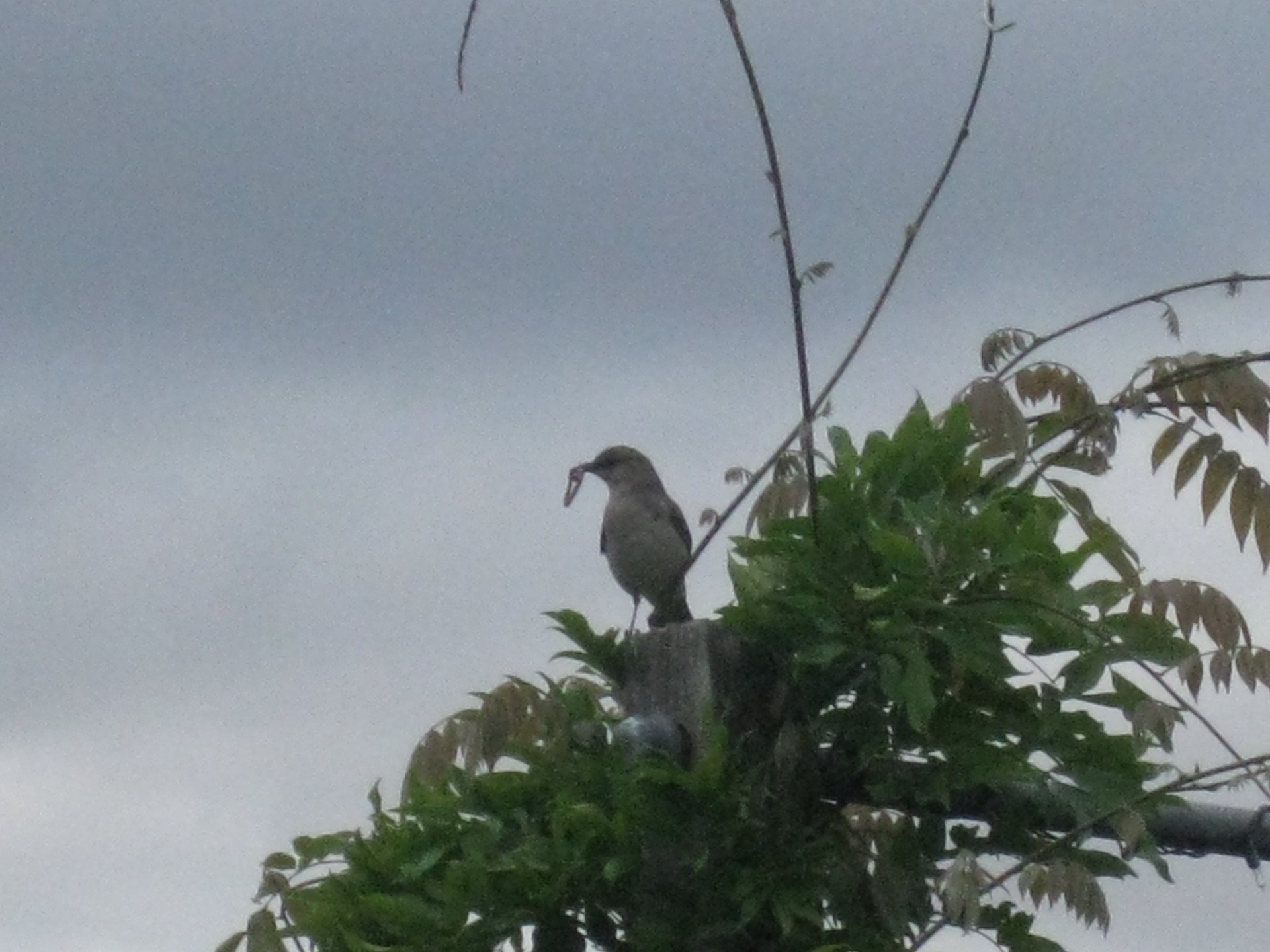Each spring—and I imagine it is the same couple that has returned for the last three years—they swoop out over the berry vines towards the gently sloping valley, soaring and twirling in their annual courtship before one disappears, she to nest, I presume. The dance goes on for weeks, then suddenly, he is by himself. The lone gray and white bird sits atop a nearby tree and sings his heart out, brightening my days with a song exuberantly full of trills and chirps and natural melody. I see him fly into the barn several times a day, checking on the nest or perhaps bringing food. It is impossible not to smile as he sings, and his effervescent mood has shamed my heavy spirits on more than one occasion. We’ve had a good relationship, this buoyant mockingbird and I.
Inside the physical boundaries of my house, such distraction is harder to track, comfort more elusive. The mockingbird’s song filters in from outside, but after more than a couple of days of pacing, beyond a single evening’s brooding pensiveness, more serious measures are required. If a strong dose of opera and comfort food—what else but cold spaghetti doused with Tabasco sauce?—fail to rouse my flagging spirits, it is time for the tea and mystery cure, a technique in which several wise resources converge to soothe a vast array of psychic ills.
In college, one of my favorite professors offered a prescription that guaranteed the pleasant passage of time if one could muster the requisite attention span, a questionable prospect in the worst cases but always worth a try.
“When there is a problem in my life,” she told me knowingly one afternoon, “I begin with the first Jane Austen novel and read straight through to the last. I know that by the time I’m done whatever the difficulty has been will have worked itself out.”
The Mystery Cure
This advice isn’t much different from that of another modern-day sage, Cynthia Heimel. In Sex Tips for Girls, one of my essential survival handbooks, she recommends the incessant reading of murder mysteries. “Especially English ones, which are a sublime blend of coziness and bloodshed, a perfect balm for shattered nerves,” she tells readers suffering from heartbreak. She also recommends that you camp on your best friend’s sofa and make her bring you cups of tea. Regardless of the exact nature and nuance of the suffering, I gather these recommendations and emerge with a cup of steaming hot vanilla tea, sweet from a little sugar and smooth from a splash of milk; my collection of Dorothy Sayer’s novels (the four with Harriet Vane); and my own cozy couch. If this doesn’t cure what ails me, well . . . I don’t know what would come next, because it has always worked.
Dorothy Sayers, a familiar icon to any reader of British mysteries, expanded the narrow, formulaic genre to embrace vivid characters and layered subplots, much to her own chagrin if we believe the stories of her impatience with her detective Lord Peter Wimsey and her desire to be done with him and get onto more serious things. The public would not let him go. In Strong Poison she attempts to lead him to the altar and abandon him there, thus providing a suitably pleasing ending for her readers and shedding herself of him at last. It was not to be. Her heroine, the Oxford-educated detective writer Harriet Vane will not have him and the charming Wimsey pursues her over three books and hundreds of pages, until, well. . . in case you haven’t read them, I’ll leave it for you to discover the next time you require such distraction.
Dorothy Sayers, born in 1893 and raised in an upper-class British family, in addition to being the best writer in her field, was a playwright, a Dante scholar, and in her later years, a Christian apologist. As a young woman, she lived at odds with convention, giving birth to a son out of wedlock at a time when it was considerably less common than today. She was both passionate and secretive, attributes that contributed to the air of mystery and intrigue that surrounded her. She was no stranger to despondency, and so it is particularly fitting that her novels provide such comfort. Dorothy Sayers died in 1957; her books and characters, especially the singular Lord Peter Wimsey and the charming Harriet Vane, live on still, tempting us out of self-indulgent bad humors when we most need it.
Bad news began to seem less like an omen and more like simple bad news, unpleasant but over before long, indicative of nothing more than itself.
Having assessed my current gloom as approximately novel length, I went straight to the third volume of the Vane quartet, seeking refuge in the academic comfort of Gaudy Night, set in Oxford and full of charm, intrigue and subtle romance, a perfect port in an emotional storm.
I turned the worn pages with a welcome familiarity, the characters appearing one by one as old friends long missed. Bad news began to seem less like an omen and more like simple bad news, unpleasant but over before long, indicative of nothing more than itself. The tea was good and soothing on my palate. I drifted off to sleep easily, and awoke early, eager to meet a new day.
Olive, my familiar, and her dark offering
I stepped out into the lavender garden and saw instantly the handiwork of Olive, my tiny long-haired black cat: petulant, spoiled Olive, my familiar; adorable little Olive, who makes exuberant leaps as she walks; Olive, who often brings to mind Scarlet O’Hara in a bad temper; Olive who eats several gophers each day with unflagging lust; Olive who dozes sweetly on my lap while I read. I averted my eyes, but not quickly enough. I had taken it all in in a single glance: the softly rounded head, the delicate gray body, the white tail feathers, the whisper of white on an open wing. It had been placed neatly, triumphantly, this dark offering, this loving betrayal, at the back door and as I tried to tell myself it wasn’t the mockingbird, the articulate silence of the morning said otherwise.






